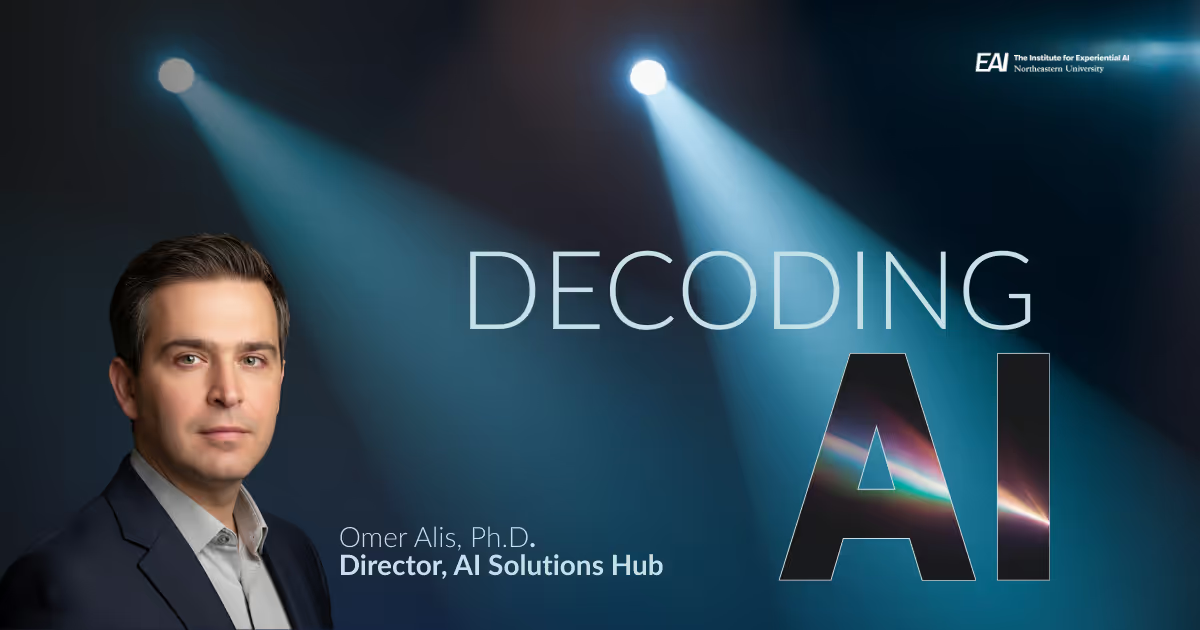Usama Fayyad Gives Advice for Navigating the AI Revolution in Finance

The finance industry stands on the brink of a transformative shift driven by advances in artificial intelligence. Finance leaders everywhere are trying to cut through hype around the technology to navigate a rapidly changing landscape.
To help finance leaders tap into AI’s potential, Institute for Experiential AI Executive Director Usama Fayyad gave a presentation Oct. 7 at Generative AI World 2024 titled, “Opportunities and Threats for GenAI in Finance.” The talk aimed to shed light on the current state of artificial intelligence, focusing on its evolution, successful use cases, and risks.
Fayyad’s talk presented recent developments in AI over the past 12 months and included some essential lessons for enterprises adopting AI. He also noted a maturing mindset around using AI among business leaders more broadly.
“Over the last year, we went from fascination around AI to pragmatism,” Fayyad said. “Executives are finally starting to understand AI’s limitations and ask the right questions. Now they want to measure its impact.”
First Data, Then AI
Fayyad pointed out that the data needed to train effective AI models is very different from the data humans use.
“Most companies don’t know how to collect the right data,” Fayyad told the audience of finance leaders. “Companies have spent decades trying to collect data for human consumption, but most of the time they don’t collect data that’s useful for AI algorithms, which require an additional level of detail.”
Fayyad, an AI industry veteran who has built AI solutions for dozens of companies and served as chief data officer at Barclays, is fond of saying that every AI project begins as a data project. In work with the Institute’s AI Solutions Hub (AISH), which helps companies adopt cutting-edge AI solutions to their most pressing business problems, he helps companies identify the biggest opportunities for AI hiding in their data.
“Successful AI deployment is totally dependent on data today, because all AI is machine learning and it’s purely data driven,” Fayyad explained.

An Inflection Point in Finance
For financial institutions, AI presents a chance to overhaul legacy systems and manual processes. JPMorgan Chase, for example, has identified hundreds of use cases for AI across its operations. But Fayyad said deploying AI in finance requires a targeted approach.
“One of my secrets for making AI work is to narrow the scope of the problem as much as possible so that ‘complete knowledge’ is possible,” Fayyad said, noting chess is a sufficiently constrained problem for AI models because all of the rules and potential moves are known. He also said factories are often limited and well-defined enough for AI systems.
So what should finance leaders focus on? Fayyad gave an overview of several use cases, including fraud detection, call routing, dynamic credit limits, and back office process automation.
However, Fayyad cautioned that AI models can introduce serious risks if not properly governed, from breaching customer privacy to perpetuating discriminatory biases. Responsible AI frameworks like the one developed at the Institute for Experiential AI are essential when using AI for high-stakes financial applications.
“Fairness and bias in algorithms can have huge consequences in finance,” Fayyad said. “If someone’s using AI to serve up personalized ads, this isn’t as big of a deal. But the stakes are higher for finance companies.”
Finance Leaders Can’t Afford to Be Left Behind
The productivity gains from generative AI could be staggering. Fayyad believes we’ll see knowledge worker productivity increase anywhere from 15 to 80 percent, noting that even a single percent increase would have huge implications for the U.S. economy.
Fayyad cited one study of AI-assisted software developers that found top programmers were 60 to 80 percent more efficient when using AI. But the benefits accrued disproportionately to highly skilled workers, a dynamic that could exacerbate skills gaps.
“People always ask, ‘Will AI take my job?’” Fayyad says. “I say, ‘AI won’t take your job, but a human using AI will take your job.’”
Fayyad’s talk came as the Institute for Experiential AI is building tailored AI solutions for finance companies of all sizes. Our team of leading data scientists, AI researchers, practitioners, and Northeastern University faculty members apply the latest methods and techniques to tackle your most complex business challenges.
Learn how our experts can apply the latest AI techniques to grow your business today.


1200w.avif)

